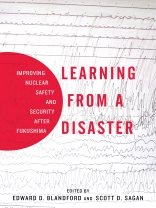This book—the culmination of a truly collaborative international and highly interdisciplinary effort—brings together Japanese and American political scientists, nuclear engineers, historians, and physicists to examine the Fukushima accident from a new and broad perspective.
It explains the complex interactions between nuclear safety risks (the causes and consequences of accidents) and nuclear security risks (the causes and consequences of sabotage or terrorist attacks), exposing the possible vulnerabilities all countries may have if they fail to learn from this accident.
The book further analyzes the lessons of Fukushima in comparative perspective, focusing on the politics of safety and emergency preparedness. It first compares the different policies and procedures adopted by various nuclear facilities in Japan and then discusses the lessons learned—and not learned—after major nuclear accidents and incidents in other countries in the past. The book’s editors conclude that learning lessons across nations has proven to be very difficult, and they propose new policies to improve global learning after nuclear accidents or attacks.
表中的内容
Introduction: Learning from a Man-made Disaster
—Scott D. Sagan
1. Japan’s Fukushima Nuclear Disaster: An Overview
—Kenji E. Kushida
2. The Accident That Could Never Happen: Deluded by a Design Basis
—Gregory D. Wyss
3. Security Implications of the Fukushima Accident
—Kaoru Naito
4. Political Leadership in Nuclear Emergency: Institutional and Structural Constraints
—Nobumasa Akiyama
5. Radiation Protection by Numbers: Another Man-made Disaster’
—Toshihiro Higuchi
6. Encouraging Transnational Organizational Learning
—Kazuto Suzuki
7. Were Japan’s Nuclear Plants Uniquely Vulnerable?
—Phillip Lipscy, Kenji E. Kushida, and Trevor Incerti
Conclusion: Beyond Fukushima: Enhancing Nuclear Safety and Security in the 21st Century
—Michael May and Edward Blandford
关于作者
Edward D. Blandford is Assistant Professor of Nuclear Engineering at the University of New Mexico. He was formerly a Stanton Nuclear Security Fellow at Stanford’s Center for International Security and Cooperation.
Scott D. Sagan is the Caroline S.G. Munro Professor of Political Science, the Mimi and Peter Haas University Fellow in Undergraduate Education, and Senior Fellow at CISAC and the Freeman Spogli Institute at Stanford University.












